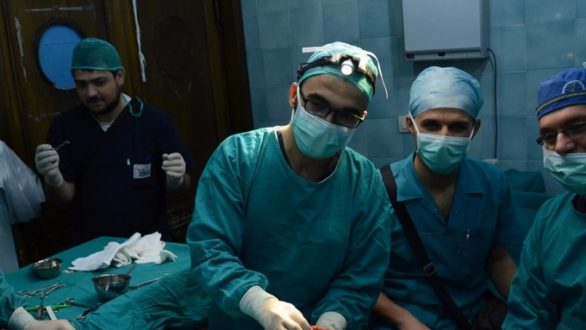The Syrian hospitals forced below the ground by Assad’s bombs
Rageh Omaar INTERNATIONAL AFFAIRS EDITOR
It says much about the horrific scale of and extent of Syria’s civil war and its effects on civilians that experienced surgeons describe being a health worker or being near a medical centre as the most dangerous things in the world.
In fact, so dangerous has it become for doctors and health workers in Syria that charities and activists have built underground hospitals, burrowed deep into mountainsides and caves in order to hide from the bombs and rockets that have targeted them.
And that is exactly what eyewitnesses say has been happening in the civil war. Dr David Nott, an experienced trauma surgeon who normally works in a leading London teaching school, has been performing operations in areas held by the Free Syrian Army rebel group for several years.

He told me of times when he was in the operating theatre as the hospital he was working in was targeted by barrel bombs.
He is adamant that the regime of President Assad, the only participant in civil war who had jet fighters and helicopters, were the ones targeting health centres and clinics. He says he is in no doubt that this is a conscious policy of war by the regime.

The aim, he tells me, is quite specific. It is to make sure that rebel held areas are effectively depopulated, because once a region or community has had all health facilities bombed or destroyed and is therefore left with nowhere to go or turn to should they need healthcare – that is the point at which civilians flee and leave the country, and with them also flee the doctors and nurses.
Dr Nott says that in 2014, when he was in Aleppo, there were around 35 doctors left in the city, and now he understands there are fewer than 10.

It’s why a collective of Syrian expatriate medical charities have worked with Syrians inside the country over the last few years to build and equip these extraordinary subterranean hospitals where the bombs and missiles cannot get to them. They are fully equipped with operating theatres, ventilation, facilities for hygiene and care.

Ghanem Tayara from the Union of Medical Care and Relief Organisations, which helped co-ordinate the building of the underground hospitals, says it was hard work.
He told me that volunteers had to start literally digging into the earth with the hands, picks and shovels, but he says that centres give hope to people and are essential if Syrians are ever to return.
He says that the support and rebuilding of health centres in Syria is an overlooked aspect in the international communities response to the crisis and needs to be boosted, because without any healthcare back home, few of the millions of Syrian refugees outside the country could contemplate returning.
ITV

